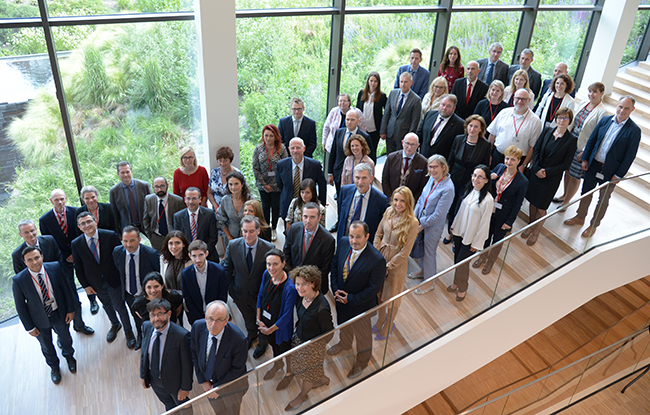Migrant smuggling is often part of a lucrative and cruel chain operated by organised crime groups (OCGs) active across national borders. Smugglers are often active in countries outside the EU, with which judicial cooperation can be very difficult. In the period 2015-2017, prosecutors and judges around the European Union referred 189 cases related to migrant smuggling to Eurojust, seeking support for a rapid and coordinated judicial response among the origin, transit and destination countries. Fifteen new joint investigation teams (JITs) were set up as tools to disrupt the OCGs involved.
The crime of migrant smuggling has been reprioritised by the Council of the EU for the period 2018-2022. An analysis by Eurojust of 30 important migrant smuggling cases shows that almost 75 per cent of migrant smuggling cases involve more than two Member States. All Member States are affected, particularly Germany, Greece, Austria, Hungary, Italy and the UK. The smugglers also often engage in other criminal activities, such as document fraud, money laundering, and trafficking in human beings. The investigation and prosecution of migrant smugglers is therefore not only cross-border in nature, but also very complex and multi-layered. The entire smuggling ring must be targeted, including the main organisers, information must be shared, and investigations must be triggered in all countries where OCG cells operate. Obtaining admissible evidence is also a vital factor in successful prosecutions.
Eurojust's findings were confirmed at a migrant smuggling experts meeting on 30 and 31 May 2018 at Eurojust's headquarters in The Hague, attended by practitioners from the Member States, Serbia and Turkey, as well as representatives from the European Commission, Eurojust, Europol, Frontex, EUNAVFOR MED, EEAS and the North Sea Task Force, which was established by Eurojust in 2016 to bring together judicial and law enforcement authorities along this smuggling route.
 'Detecting cross-links between the numerous and hidden smuggling cells operating in different countries and cooperating with third States are crucial', said Filippo Spiezia, Chair of Eurojust's Anti-Trafficking Team. 'In this context, JITs are a particularly effective instrument we can offer to achieve this goal. They allow for a fast and efficient exchange of information among JIT members and facilitate prompt and decisive action in all countries involved.'
'Detecting cross-links between the numerous and hidden smuggling cells operating in different countries and cooperating with third States are crucial', said Filippo Spiezia, Chair of Eurojust's Anti-Trafficking Team. 'In this context, JITs are a particularly effective instrument we can offer to achieve this goal. They allow for a fast and efficient exchange of information among JIT members and facilitate prompt and decisive action in all countries involved.'
One example of a JIT making a major difference is the one established in the 'Halifax' case (see also infographic). This case involved a new form of criminal organisation involving a large facilitation network consisting of independent and well-organised cells spread all over Europe as well as Afghanistan, Pakistan and Vietnam. Migrants were transported through Bulgaria, Belgium, France and the Netherlands in specially adapted vehicles, bound for the UK. The case was opened at Eurojust at the initiative of the UK authorities. Two coordination meetings were held at Eurojust, and as a result, participants agreed that such a complex and sophisticated criminal network necessitated a joint and targeted response. Consequently, Eurojust supported the negotiating and financing of a JIT. The case brought together representatives from the destination and transit countries as well as the countries providing logistical support to the OCG, all in an atmosphere of trust and confidence. The case is ongoing, and arrests have already taken place.

